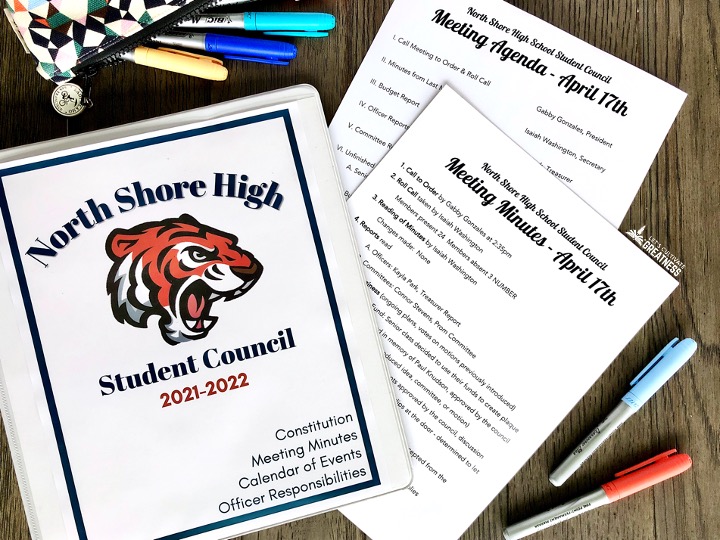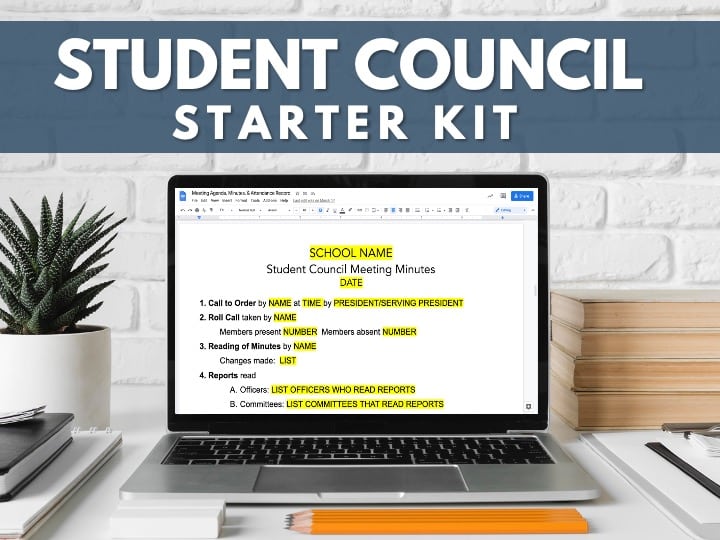One of the main responsibilities of being a student council advisor is often the most intimidating: running the official student council meeting.These meetings are different from the informal ones you routinely have with your Leadership class or smaller executive team. Those are usually where the bulk of the day-to-day decisions are made—things like homecoming dress up day themes or planning for assemblies.
An official student council meeting is where official decisions are made, ones that require a formal vote and record: budget approvals, changes to the constitution or other policies, verifying officer election results.
These meetings can also be a time for announcements, committee reports, or guest speakers. Be sure to check with your state-level student government association for details on the specific laws and guidance for what your meetings need to cover.
The biggest mistake I made my first few years as an advisor, though, wasn’t so much all the formal voting and record-keeping of the meeting itself, but rather the work before and after meetings to really make them run smoothly and openly.
Our meetings used to be random and reactionary—think emergency meetings to approve funds for a dance venue. We did not have a standing meeting time and place, meaning all that best-practice stuff that makes for an effective student government didn’t happen.
We have gotten a lot better since, especially with planning for these regular meetings from the start of the year. Don’t worry, though—even if your year’s already underway, all these tips can be implemented as part of a mid-year reboot.
Beginning of the Year: Plan Out Your Meetings
At the start of your school year, sit down with your student officers or Leadership class and pencil the meetings into your shared calendar for the whole year. Hold at least a monthly meeting, but if you’re at a larger school, twice a month may be needed to address all the business decisions that come up.
Plan for a second-and-fourth-Wednesday-of-the-month routine to avoid turning the calendar page and forgetting a meeting is the next day. Then once you have them all plotted, share the dates with your school secretary to get placed on the school-wide calendar.
You’ll want to schedule these meetings for a time and place that’s easy for everyone to attend. At my small school, we hold ours during our schoolwide lunch period in the library so it’s accessible to all students. We are able to reserve the library for those times so we have the whole space. You could also meet before school or during an advisory time.
Check out my post of step-by-step tips for building a master StuCo calendar if you are looking for more ways to set up your year for organized success.
Once your meetings are set, hold a dress rehearsal with your officers to run through all the formalities they’ll need to follow—calling the meeting to order, making motions and seconds, taking votes, etc.—as well as what each member is responsible for contributing.
Week and Day Of: Prepare for A Productive Meeting
I love Wednesday meetings because it naturally creates time in the week for both preparing and follow-up, while it’s fresh in everyone’s mind. Here’s our basic routine:
Friday before: Have officers create an agenda and put a request in the daily announcements asking for any other business items.
Monday before: Finalize and send out the agenda to all people who are expected to attend, as well as your principal and school secretary.
Remind everyone responsible for presenting a report to finalize theirs. This includes the Secretary’s minutes from the last meeting, the Treasurer’s updated budget report, and any other groups that are on the agenda, like committees, clubs, or sports teams.
Morning of: Put a reminder of the meeting in the daily announcements.
During: Host a Great Meeting
The biggest thing to remember is that you, the advisor, play a sideline role in the meeting. Your executive team runs it, not you.
Unsure of all the motions, and seconds, and approvals that’re needed? Neither did I really when I started. First, absolutely check with your state-level student government association for any legal specifics you’ll need to follow.
After that, it’s up to you how formal you and your officers want the proceedings to go.

In my Student Council Starter Kit, along with agenda and minutes templates, you’ll get a cheat sheet handout of the basics of parliamentary procedure that students can refer to during the meeting. Having something like this is especially helpful for them in the beginning of the year!
Essentially, after the previous meeting’s minutes and reports are approved, it’s time to discuss any decisions or requests being made. Students make motions and seconds to open and close discussion and to vote on decisions, with the secretary recording who made the motions and what the vote was.
It’s good to have a set amount of time allotted for each issue to ensure there’s time for everything on the agenda. This can also help prioritize any time-sensitive decisions at the beginning of the agenda, like approving money expenditures.
While on the sidelines, you can best help by keeping an eye on the clock, answering questions as needed, and reminding them of the protocols if something major isn’t followed.
Afterwards: Finalize Records & Next Steps
Before adjourning, check in with your secretary and treasurer to confirm they recorded all the decisions made and that attendance was taken.
Have them submit their reports within the following day or two, either to a physical binder or a shared cloud folder. Label the reports as “DRAFT,” then share with your attendees and anyone else affected by the decisions made. Once they are approved at the next meeting the label can be replaced with “FINAL.”
If needed, host a quick follow-up meeting at the start of your next Leadership class to share out and review what was decided and announced. Add anything new to your master calendar, creating new committees or assigning any new tasks as needed.
If all this planning and logistics seems overwhelming as a new advisor, first, you’re not alone! Second, you’ll love my Student Council Starter Kit, which includes all the things—templates, idea sheets, and samples—you’ll need to be an awesome and organized advisor from the start. Seriously, everything from a draft study body constitution to election materials to meeting minute and agenda templates are all here. It’s all the things I wish I had my first year as an advisor.

Feature image credit: Jeswin Thomas









